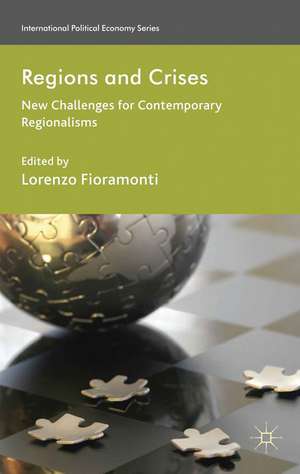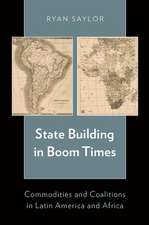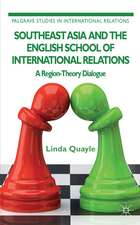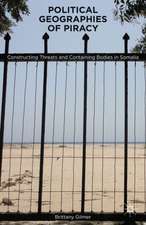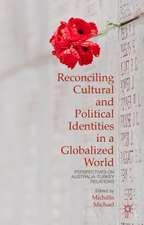Regions and Crises: New Challenges for Contemporary Regionalisms: International Political Economy Series
Autor Lorenzo Fioramontien Limba Engleză Hardback – 26 iun 2012
| Toate formatele și edițiile | Preț | Express |
|---|---|---|
| Paperback (1) | 383.50 lei 6-8 săpt. | |
| Palgrave Macmillan UK – 2012 | 383.50 lei 6-8 săpt. | |
| Hardback (1) | 391.61 lei 6-8 săpt. | |
| Palgrave Macmillan UK – 26 iun 2012 | 391.61 lei 6-8 săpt. |
Din seria International Political Economy Series
- 20%
 Preț: 751.82 lei
Preț: 751.82 lei - 17%
 Preț: 363.47 lei
Preț: 363.47 lei - 20%
 Preț: 627.54 lei
Preț: 627.54 lei -
 Preț: 428.68 lei
Preț: 428.68 lei - 9%
 Preț: 762.79 lei
Preț: 762.79 lei -
 Preț: 140.78 lei
Preț: 140.78 lei - 20%
 Preț: 690.96 lei
Preț: 690.96 lei - 20%
 Preț: 566.63 lei
Preț: 566.63 lei -
 Preț: 430.59 lei
Preț: 430.59 lei - 17%
 Preț: 490.23 lei
Preț: 490.23 lei -
 Preț: 147.23 lei
Preț: 147.23 lei -
 Preț: 196.85 lei
Preț: 196.85 lei -
 Preț: 277.68 lei
Preț: 277.68 lei -
 Preț: 389.11 lei
Preț: 389.11 lei -
 Preț: 385.08 lei
Preț: 385.08 lei -
 Preț: 389.70 lei
Preț: 389.70 lei -
 Preț: 389.31 lei
Preț: 389.31 lei - 15%
 Preț: 644.30 lei
Preț: 644.30 lei -
 Preț: 413.84 lei
Preț: 413.84 lei -
 Preț: 387.38 lei
Preț: 387.38 lei - 15%
 Preț: 638.89 lei
Preț: 638.89 lei - 15%
 Preț: 644.63 lei
Preț: 644.63 lei - 18%
 Preț: 893.71 lei
Preț: 893.71 lei -
 Preț: 412.47 lei
Preț: 412.47 lei -
 Preț: 325.08 lei
Preț: 325.08 lei -
 Preț: 395.47 lei
Preț: 395.47 lei - 15%
 Preț: 641.85 lei
Preț: 641.85 lei -
 Preț: 391.40 lei
Preț: 391.40 lei -
 Preț: 388.34 lei
Preț: 388.34 lei - 15%
 Preț: 640.55 lei
Preț: 640.55 lei - 15%
 Preț: 646.30 lei
Preț: 646.30 lei - 15%
 Preț: 637.78 lei
Preț: 637.78 lei - 15%
 Preț: 643.84 lei
Preț: 643.84 lei -
 Preț: 386.99 lei
Preț: 386.99 lei - 15%
 Preț: 641.53 lei
Preț: 641.53 lei -
 Preț: 386.81 lei
Preț: 386.81 lei - 15%
 Preț: 639.73 lei
Preț: 639.73 lei - 18%
 Preț: 944.19 lei
Preț: 944.19 lei -
 Preț: 391.40 lei
Preț: 391.40 lei -
 Preț: 330.65 lei
Preț: 330.65 lei -
 Preț: 394.12 lei
Preț: 394.12 lei -
 Preț: 386.99 lei
Preț: 386.99 lei -
 Preț: 386.81 lei
Preț: 386.81 lei - 15%
 Preț: 634.68 lei
Preț: 634.68 lei -
 Preț: 387.75 lei
Preț: 387.75 lei -
 Preț: 392.60 lei
Preț: 392.60 lei - 15%
 Preț: 641.53 lei
Preț: 641.53 lei - 15%
 Preț: 640.06 lei
Preț: 640.06 lei - 15%
 Preț: 643.16 lei
Preț: 643.16 lei - 15%
 Preț: 642.68 lei
Preț: 642.68 lei
Preț: 391.61 lei
Nou
Puncte Express: 587
Preț estimativ în valută:
74.94€ • 77.32$ • 63.43£
74.94€ • 77.32$ • 63.43£
Carte tipărită la comandă
Livrare economică 05-19 martie
Preluare comenzi: 021 569.72.76
Specificații
ISBN-13: 9780230348783
ISBN-10: 0230348785
Pagini: 264
Ilustrații: XVII, 242 p.
Dimensiuni: 140 x 216 x 23 mm
Greutate: 0.5 kg
Ediția:2012
Editura: Palgrave Macmillan UK
Colecția Palgrave Macmillan
Seria International Political Economy Series
Locul publicării:London, United Kingdom
ISBN-10: 0230348785
Pagini: 264
Ilustrații: XVII, 242 p.
Dimensiuni: 140 x 216 x 23 mm
Greutate: 0.5 kg
Ediția:2012
Editura: Palgrave Macmillan UK
Colecția Palgrave Macmillan
Seria International Political Economy Series
Locul publicării:London, United Kingdom
Cuprins
Introduction: Regionalism in Times of Crises; L.Fioramonti PARTI: CRISES, REGIONALISM AND THE FUTURE OF EUROPEAN INTEGRATION Crisis and Regional Integration: a Federalist and Neo-functionalist Perspective; S.von Dosenrode Surviving through Legitimacy Crises: what Political Integration for Europe?; M.Teló 'One for all and all for one': the Global Financial Crisis and the European Project; P.Leblond The End of Solidarité? The Euro-crisis and the EU Model of Integration; P.Holden PARTII: CRISES AND REGIONALISM BEYOND EUROPE A Region of Crises: North Africa under the Influence of Arab, African and European Regionalisms; W.Zank The EU's Mediterranean Policies after the Arab Revolts: from Crisis to a New Order?; J.P.Cassarino & N.Tocci 'Securitizing' Migration Crises: the EU, North Africa and Transatlantic Regional Cooperation; M.Ceccorulli Regionalism in Africa: Development Crises and the Growing Influence of Emerging Powers; M.Qobo & D.Motsamai Crafted by Crises: Regional Integration and Democracy in South America; E.Mosinger A Paradigm in Trouble? The Effects of the 2010 Euro-crisis on the European Model for Regional Integration in South America; E.Lazarou Post-crisis Regional Cooperation in East Asia: New Trends and Developments; E.Koldunova Conclusion: the Future of Regionalism; L.Fioramonti
Recenzii
'An essential reading for anyone interested in a deeper understanding of how crises affect regionalism throughout the world, with a particular emphasis on the long-term implications of the current European crisis.' Amitav Acharya, American University, Washington, DC, USA, and UNESCO Chair in Transnational Challenges and Governance
'Crises have been part of the process of supra-national regional integration starting with the one in Europe. Will the contemporary economic-financial crisis prove to be 'good' or 'bad' for the regionalisms of the world? Will crises compel regions to adapt by increasing or decreasing their mutual commitments? This book is a path-breaking effort to answer these crucial questions with regard to Europe, Africa, South America and East Asia.' Philippe C. Schmitter, European University Institute, Florence, Italy and Central European University, Budapest, Hungary
'Like no one else before, this outstanding book brings together two of the most important traits of the 21st century: crises and regionalism. Moreover it manages to bridge the unfortunate divide between European integration studies and comparative regionalism. Simply a 'mustread' for anyone who wants to understand contemporary world affairs.' Fredrik Söderbaum, School of Global Studies, University of Gothenburg, Sweden
'This book provides an innovative perspective on regional integration and shows how crises can open up new spaces for action. It providesinvaluable insights on the future of Europe and for students of regionalism across the globe.' Martin Holland, National Centre for Research on Europe, University of Canterbury, Christchurch, New Zealand
'This volume is valuable to academics and students with an interest in the Euro crisis and its consequences for regionalism, as well as in the state of integrative efforts in Africa, South America and East Asia and their responses to key challenges both internal and external in nature.' - Matthew Doidge, ANZJES
'This book has the great merit of having explored the phenomenon of regionalism from an unconventional perspective (comparative and in relation to crises) and of having asked a number of good questions, of which there was a desperate need.' - Sonia Lucarelli, The International Spectator
'Crises have been part of the process of supra-national regional integration starting with the one in Europe. Will the contemporary economic-financial crisis prove to be 'good' or 'bad' for the regionalisms of the world? Will crises compel regions to adapt by increasing or decreasing their mutual commitments? This book is a path-breaking effort to answer these crucial questions with regard to Europe, Africa, South America and East Asia.' Philippe C. Schmitter, European University Institute, Florence, Italy and Central European University, Budapest, Hungary
'Like no one else before, this outstanding book brings together two of the most important traits of the 21st century: crises and regionalism. Moreover it manages to bridge the unfortunate divide between European integration studies and comparative regionalism. Simply a 'mustread' for anyone who wants to understand contemporary world affairs.' Fredrik Söderbaum, School of Global Studies, University of Gothenburg, Sweden
'This book provides an innovative perspective on regional integration and shows how crises can open up new spaces for action. It providesinvaluable insights on the future of Europe and for students of regionalism across the globe.' Martin Holland, National Centre for Research on Europe, University of Canterbury, Christchurch, New Zealand
'This volume is valuable to academics and students with an interest in the Euro crisis and its consequences for regionalism, as well as in the state of integrative efforts in Africa, South America and East Asia and their responses to key challenges both internal and external in nature.' - Matthew Doidge, ANZJES
'This book has the great merit of having explored the phenomenon of regionalism from an unconventional perspective (comparative and in relation to crises) and of having asked a number of good questions, of which there was a desperate need.' - Sonia Lucarelli, The International Spectator
Notă biografică
JEAN-PIERRE CASSARINO Professor at the Robert Schuman Centre for Advanced Studies, ItalyMICHELA CECCORULLI Researcher at the Forum on the Problems of Peace and War and a fellow at the University of Bologna, ItalySØREN VON DOSENRODE Jean Monnet Professor of European Politics and Administration at Aalborg University, Denmark PATRICK HOLDEN Lecturer in International Relations at the Plymouth Business School, University of Plymouth, UKEKATERINA KOLDUNOVA Deputy Dean of the School of Political Affairs, Moscow State University of International Relations, RussiaELENA LAZAROU Assistant Professor at the Center for International Relations of the Getulio Vargas Foundation (FGV), Rio de Janeiro, BrazilPATRICK LEBLOND Associate Professor in the Graduate School of Public and International Affairs at the University of Ottawa, CanadaERIC MOSINGER is a PhD candidate at the University of California Irvine, USADIMPHO MOTSAMAI Researcher in the Africa Conflict Prevention Program (ACPP) of the Institute for Security Studies (ISS), South AfricaMZUKISI QOBO Political risk and international relations consultantMARIO TELÒ Vice-President of the Institute of European Studies, Université Libre de Bruxelles, BelgiumNATHALIE TOCCI Deputy Director of the Istituto Affari Internazionali, ItalyWOLFGANG ZANK Associate Professor, Aalborg University, Denmark
